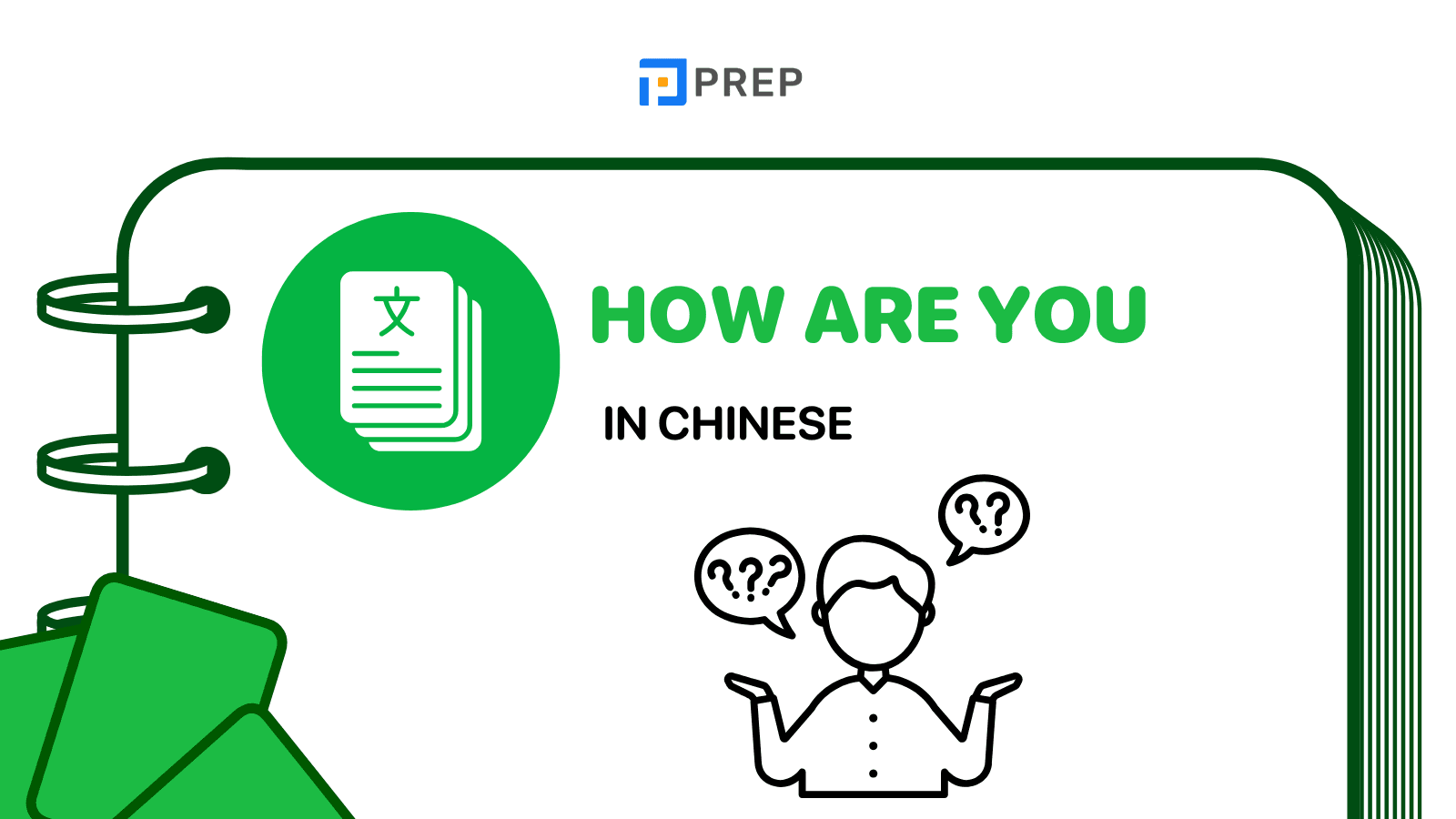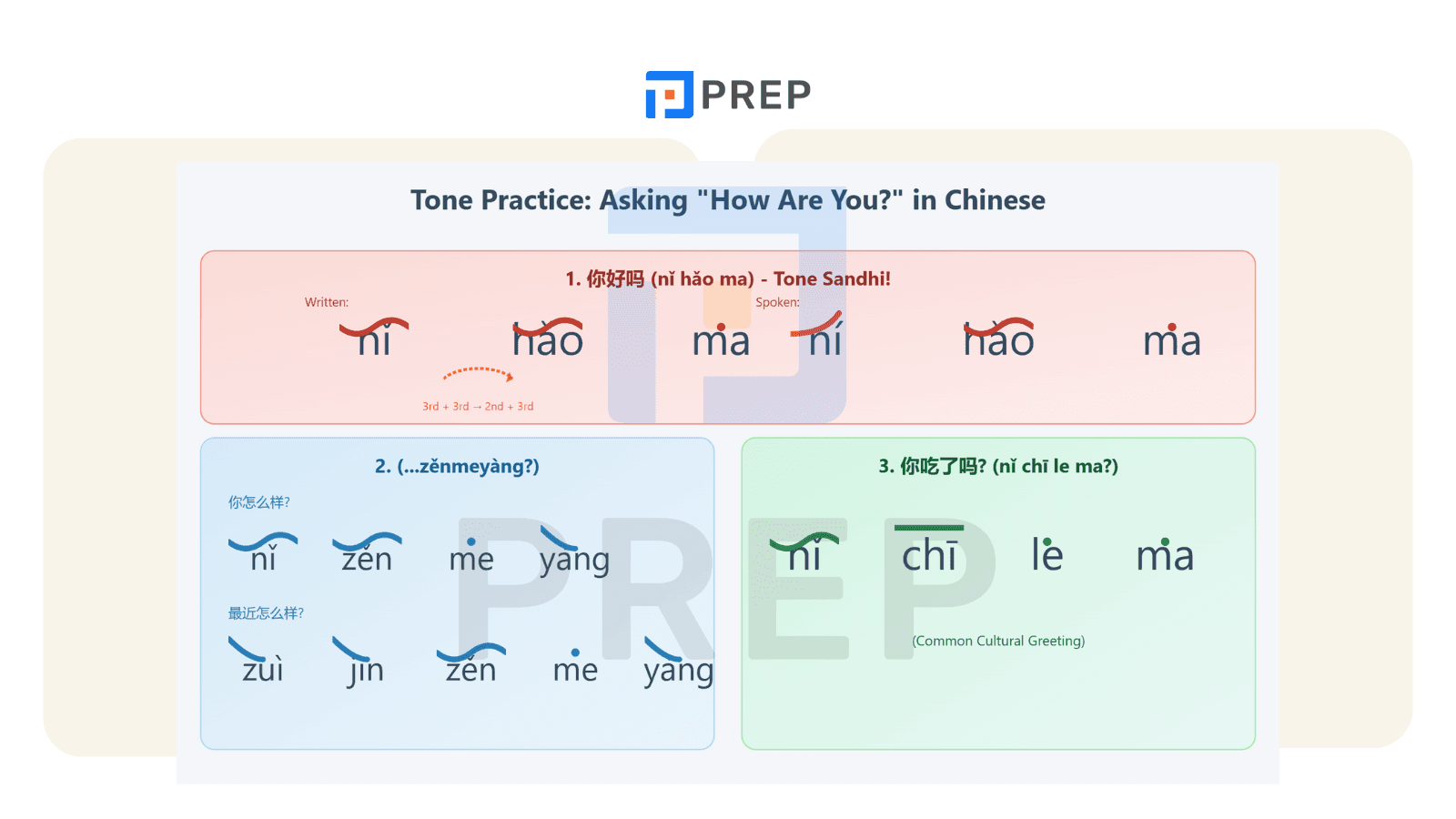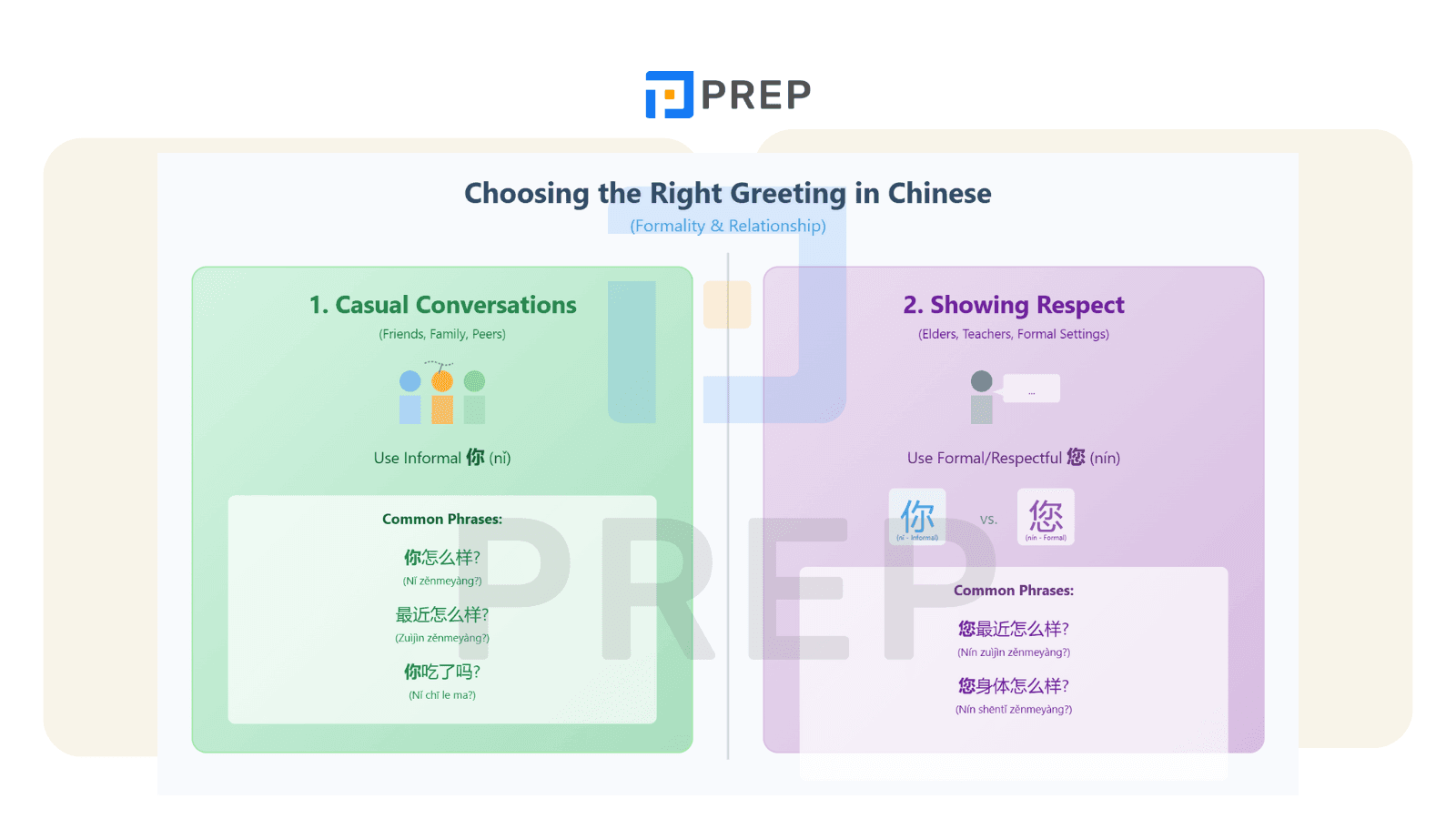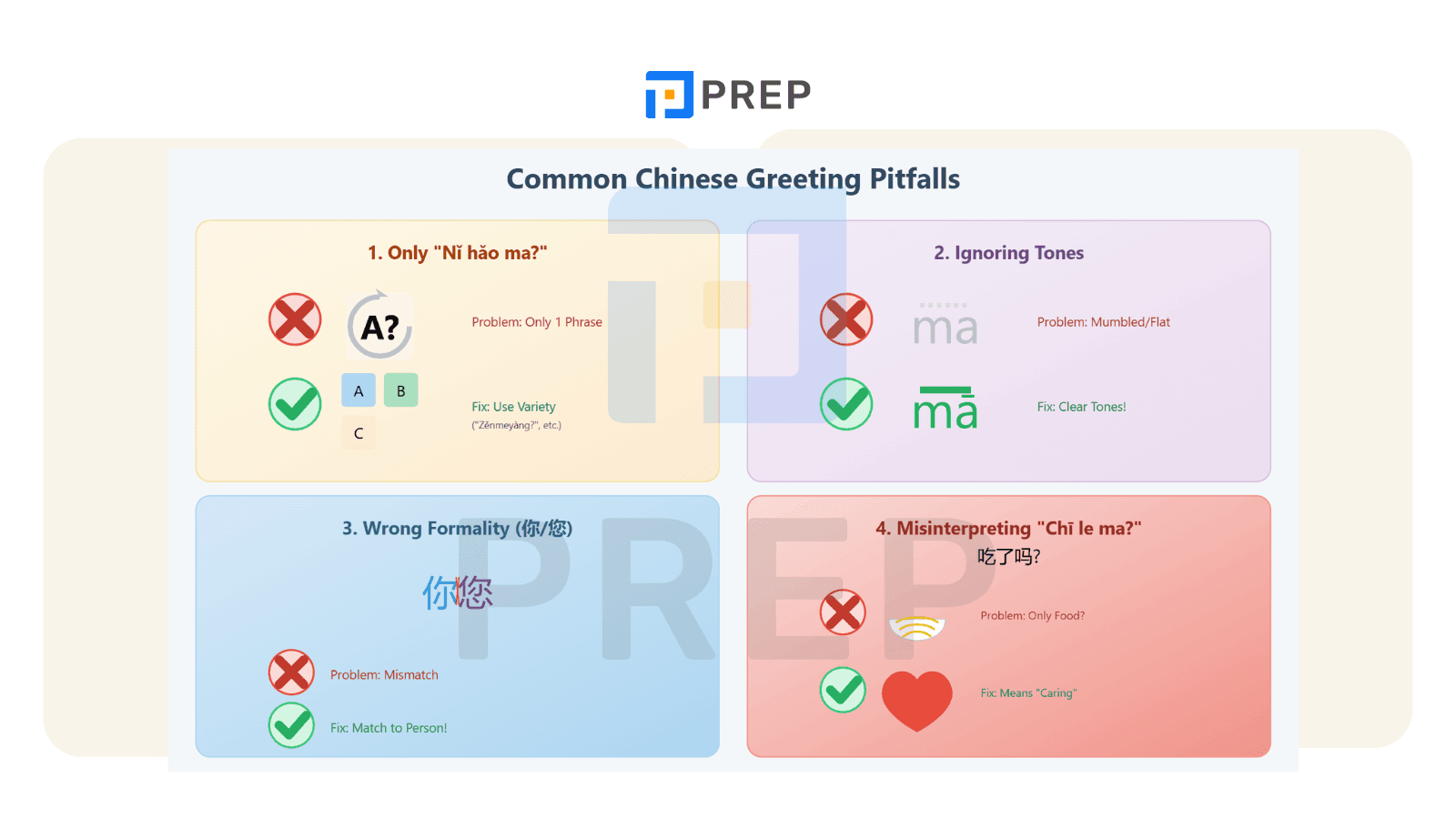The Ultimate Guide to Asking How Are You in Chinese: Beyond the Basics
When learning Mandarin Chinese, you might confidently approach a native speaker with "你好吗?" (Nǐ hǎo ma?), only to receive a puzzled smile in return. Despite being the textbook translation for "how are you in Chinese," this phrase often sounds strangely formal to native ears—equivalent to saying "How do you do?" in modern English conversation.
This comprehensive guide reveals what native Chinese speakers actually say when asking "how are you in Chinese." We'll explore natural alternatives to textbook phrases, proper pronunciation, and cultural context to help you communicate authentically in everyday Mandarin conversations.
The gap between classroom Chinese and street Chinese creates a common challenge for language learners. While "你好吗?" is grammatically correct, it lacks the warmth and naturalness that characterizes daily Chinese interaction. Instead, phrases like "你怎么样?" (Nǐ zěnmeyàng?) and "最近怎么样?" (Zuìjìn zěnmeyàng?) serve as go-to expressions for asking about someone's wellbeing.
These alternatives reflect important cultural and contextual aspects of Chinese communication. For instance, "你怎么样?" functions similarly to "How's it going?" in English—casual yet appropriate in most everyday scenarios with peers. Meanwhile, "最近怎么样?" specifically inquires about recent experiences, making it perfect for reconnecting with someone after time apart.
Perhaps most fascinating is the culturally rich greeting "你吃了吗?" (Nǐ chī le ma?), which literally translates to "Have you eaten?" yet functions as "How are you?" This phrase reveals China's historical emphasis on food security and family care, demonstrating how language reflects societal priorities and values.
Understanding these nuances not only improves your speaking ability but deepens your cultural comprehension. Each phrase carries subtle connotations about relationship, formality, and social context that the standard textbook greeting simply cannot convey.
In this guide, you'll master authentic Chinese greetings for every context, learn proper tonal pronunciation that prevents misunderstandings, discover appropriate responses, and understand the cultural significance behind each expression. These skills will help you build genuine connections and avoid sounding like a textbook.
Ready to sound more like a native speaker and less like a student? Let's explore how Chinese people actually greet each other in everyday situations, starting with the most common natural phrases.
- I. Overview
- II. First Things First: The Phrase You Learned vs. What Natives Use
- III. Asking "How Are You?" Like a Native: Common & Natural Phrases
- IV. Nailing the Sound: Pronunciation Essentials for Chinese Greetings
- V. Responding Appropriately: How to Answer When Asked
- VI. Context Matters: Choosing the Right Greeting (Formality & Relationship)
- VII. You've Mastered the Essentials! Now, Let's Address Lingering Questions & Nuances
- VIII. Frequently asked questions & deeper insights
- 1. Is it ever truly wrong to use "Nǐ hǎo ma?" in China?
- 2. What is the core cultural function of greetings like "Chī le ma?" beyond their literal meaning?
- 3. Beyond asking "How are you?", what are other essential Chinese greeting categories learners should know?
- 4. How does the frequency and expectation of asking "How are you?" in Chinese culture compare to typical English-speaking cultures?
- 5. If someone gives a very brief reply like "Hái xíng", how should I continue the conversation naturally?
- IX. Avoiding Common Pitfalls: Greeting Mistakes That Mark You as a Learner
- X. Conclusion: Moving From Basic Greetings to Confident Conversation

I. Overview
When learning a new language, one of the first phrases we often seek is "How are you?" It's a fundamental social lubricant, opening conversations and establishing connections. If you're looking to express "how are you in Chinese" or wondering about "how to say hello how are you in mandarin," you might be surprised to discover that the direct translation you've learned isn't what natives typically use in daily conversation. Many learners struggle with "how to say how are you in Chinese" or “how to say how ru in Chinese” naturally.
This comprehensive guide addresses a common dilemma: you've memorized "你好吗?" (Nǐ hǎo ma?) from textbooks, only to find that native speakers rarely use it. Whether you're asking "how are you doing in Chinese" or "hello how are you in Chinese," I'll equip you with authentic expressions, proper pronunciation, appropriate responses, and crucial context—enabling you to communicate more naturally and build genuine connections when asking "in Chinese how are you."
II. First Things First: The Phrase You Learned vs. What Natives Use
There exists a significant gap between the standard "how are you in Chinese" taught in classrooms and what actually occurs in daily Chinese conversation. Many learners ask "how r u in Chinese" or "how are u Chinese" without realizing this distinction isn't merely academic—it affects how others perceive you and influences the quality of your interactions. Whether you're learning "how are you in Chinese mandarin" or "how are you Chinese language," understanding this difference marks your first step toward more authentic communication when learning "Chinese how are you" expressions.
1. Understanding the Textbook Greeting: 你好吗 (Nǐ hǎo ma?)
"你好吗?" (Nǐ hǎo ma?) is grammatically correct and appears in most Chinese language textbooks as the standard translation for "How are you in Chinese." When asking "how do we say how are you in Chinese" or searching for "how are you Chinese translation," this is typically the first phrase you'll encounter. While technically accurate, this phrase often sounds formal or unnatural to native ears in casual settings. Think of it as similar to saying "How do you do?" in modern English conversation—correct but somewhat stiff. Many wonder "how are you in China" in everyday situations, and this textbook phrase isn't always the answer.
1.1 Characters, Pinyin, and Literal Meaning Breakdown
-
Chinese Characters: 你好吗
-
Pinyin: Nǐ hǎo ma
-
Character Meaning: 你 (nǐ) = you, 好 (hǎo) = good, 吗 (ma) = question particle
-
Functional Meaning: "Are you good/well?" or simply "how are you in Chinese"
For those wondering "how to write how are you in Chinese," these three characters (你好吗) form the basic written expression, though as we'll discover, there are more natural alternatives for "how are you mandarin chinese" conversations.
1.2 Why "Nǐ hǎo ma?" Sounds Formal or Uncommon in Daily Chats
Using "Nǐ hǎo ma?" in casual settings can feel similar to saying "Are you well?" in English when most people would simply say "What's up?" or "How's it going?" It creates a sense of distance and formality that doesn't match the warmth Chinese speakers typically bring to their interactions. This phrase lacks the natural flow and familiarity of daily Chinese conversation when asking how are you in Chinese.
1.3 When You Might Still Hear or Use "Nǐ hǎo ma?" (Limited Contexts)
Despite its limitations, "Nǐ hǎo ma?" does have specific applications. You might encounter it in formal diplomatic settings, textbooks for beginners, or interactions with non-native Chinese speakers. In these limited contexts, the phrase serves its purpose when asking how are you in Chinese, but they represent exceptions rather than the rule in everyday Chinese communication.
III. Asking "How Are You?" Like a Native: Common & Natural Phrases
Now that we understand the limitations of the textbook greeting, let's explore what native speakers actually say. These authentic phrases vary in formality and context, allowing you to select the most appropriate expression for each situation—an essential skill for sounding natural when asking how are you in Chinese.
1. The Everyday Go-To: 你怎么样? (Nǐ zěnmeyàng?)
This versatile phrase serves as the most common and natural way to ask "how are you in Chinese." If you're wondering "how you say how are you in chinese" in a more authentic way, this is it. It functions similarly to "How's it going?" in English—casual enough for friends but still appropriate in many everyday situations. For those learning "how are you doing chinese" expressions, this is essential vocabulary.
1.1 Characters, Pinyin, and Meaning
-
Chinese Characters: 你怎么样?
-
Pinyin: Nǐ zěn me yàng?
-
Meaning: "How are you?" / "How's it going?" / "What's up?"
When searching for "how are you chinese" phrases that natives actually use, or "chinese for how are you doing," this expression should be at the top of your list. If you want to say "hi how are you in chinese" in a natural way, start with "你好" (hello) followed by "你怎么样?"
1.2 Situations: Perfect for Casual, Everyday Check-ins with Friends & Peers
"Nǐ zěnmeyàng?" works perfectly in most everyday interactions with friends, classmates, or colleagues. It strikes the right balance between showing interest and maintaining a comfortable casualness. You can use it when passing a coworker in the hallway, meeting a friend for coffee, or checking in with a classmate before class begins. This is one of the most versatile ways to ask how are you in Chinese.
2. Checking In On Recent Times: 最近怎么样? (Zuìjìn zěnmeyàng?)
This phrase specifically asks about someone's recent experiences, making it perfect for reconnecting after some time apart. It shows slightly deeper interest than a simple greeting when asking "how are you in Chinese." For those wondering "how are you doing in mandarin" with a time element, this is the perfect phrase.
2.1 Characters, Pinyin, and Meaning
-
Chinese Characters: 最近怎么样?
-
Pinyin: Zuì jìn zěn me yàng?
-
Meaning: "How have things been recently?" / "How's it going lately?"
If you're looking up "how ru in mandarin" or "how ru in chinese" for reconnecting with someone, this phrase is more appropriate than the basic textbook greeting. When asking "how to say how are you in mandarin" or “how do you say how are you in mandarin” with a sense of time, this is the phrase Chinese speakers would recommend.
2.2 Situations: Ideal When Showing Interest After Some Time Apart
Use "Zuìjìn zěnmeyàng?" when meeting someone you haven't seen for a while—perhaps a week, a month, or longer. It acknowledges the passage of time and expresses genuine interest in what has happened during your absence. This phrase works well with friends, colleagues, acquaintances, or family members you're reconnecting with. For anyone wondering “how do you say how are you in Chinese” after not seeing someone for a while, this is the perfect phrase.
3. A Culturally Rich Greeting: 你吃了吗? (Nǐ chī le ma?)
This uniquely Chinese greeting literally translates to "Have you eaten?" but functions culturally as "How are you?" This phrase reveals deep cultural values and historical context—a fascinating example of how language reflects societal priorities when asking how are you in Chinese.
3.1 Characters, Pinyin, and Literal Meaning
-
Chinese Characters: 你吃了吗?
-
Pinyin: Nǐ chī le ma?
-
Literal Meaning: "Have you eaten?"
3.2 The Deeper Meaning: Understanding "Chī le ma?" as Showing Care and Connection
"Nǐ chī le ma?" reflects China's historical emphasis on food security and family care. In a culture where sharing meals symbolizes connection and ensuring loved ones have eaten represents a fundamental expression of concern, asking about meals became a natural way to check on someone's well-being. This greeting communicates warmth and care within close relationships when expressing how are you in Chinese.
3.3 Situations: Best Used Casually Among Familiar People; Less Common with Younger Generations
This phrase works best among neighbors, relatives (especially older ones), and close acquaintances in casual settings. While its usage has declined somewhat among younger urban populations, it remains culturally significant and worth knowing. Exercise caution when deciding whether to use it, as context matters significantly when asking how are you in Chinese.
IV. Nailing the Sound: Pronunciation Essentials for Chinese Greetings
Learning how to ask "how are you in Chinese" involves more than memorizing characters—proper pronunciation, especially tones, is crucial for being understood.
1. Why Tones Are Crucial in Mandarin Greetings
Mandarin Chinese uses four main tones plus a neutral tone to distinguish between otherwise identical syllables. Incorrect tones can completely change a word's meaning or render your speech unintelligible. For instance, the syllable "ma" can mean "mother" (mā), "hemp" (má), "horse" (mǎ), or "scold" (mà) depending solely on the tone used. This is essential when learning "how are you in Chinese language" or "how are you in mandarin language." Many learners of "how are you china language" struggle with tones initially, but they're fundamental to being understood when asking "chinese language how are you."
2. Mastering the Tones for Key "How Are You?" Phrases
2.1 Tone Practice: 你好吗 (nǐ hǎo ma)
A critical pronunciation note: When two third tones appear consecutively, as in "nǐ hǎo," the first third tone changes to a second tone in actual speech. Therefore, while written as nǐ hǎo ma, it's pronounced more like ní hǎo ma. This phenomenon is called "third tone sandhi" and mastering it will significantly improve your pronunciation when asking how are you in Chinese.
2.2 Tone Practice: 你怎么样? (nǐ zěnmeyàng?) / 最近怎么样? (zuìjìn zěnmeyàng?)
For "nǐ zěnmeyàng?": nǐ (3rd tone), zěn (3rd tone), me (neutral tone), yàng (4th tone) For "zuìjìn zěnmeyàng?": zuì (4th tone), jìn (4th tone), zěn (3rd tone), me (neutral tone), yàng (4th tone)
2.3 Tone Practice: 你吃了吗? (nǐ chī le ma?)
nǐ (3rd tone), chī (1st tone), le (neutral tone), ma (neutral tone)

3. Listening & Mimicking: Tips for Accurate Pronunciation
Active listening forms the foundation of accurate pronunciation. Break down each phrase into individual syllables, practice each tone separately, then combine them into complete phrases. Record yourself speaking and compare it to native pronunciations. Remember that mastering tones requires consistent practice and patience—a worthy investment for clear communication when learning how are you in Chinese.
V. Responding Appropriately: How to Answer When Asked
Knowing how to respond when someone asks "how are you in Chinese" is just as important as knowing how to ask. Here are common, natural responses for various situations.
1. Simple Positive Replies
-
我很好 (Wǒ hěn hǎo) - I'm very good / I'm fine.
-
挺好的 (Tǐng hǎo de) - Pretty good.
-
不错 (Bú cuò) - Not bad / Good.
Note that "hěn" (very) in "Wǒ hěn hǎo" doesn't necessarily indicate exceptional well-being—it's often included for grammatical flow rather than emphasis when answering how are you in Chinese.
2. Neutral & So-So Replies
-
还行 (Hái xíng) - Okay / Alright.
-
马马虎虎 (Mǎ mǎ hū hū) - So-so (colloquial expression that sometimes implies mild dissatisfaction).
-
一般般 (Yì bān bān) - Just okay / Average.
3. Responding to "你吃了吗?" (Nǐ chī le ma?)
-
吃了 (Chī le) - (I've) eaten.
-
还没呢 (Hái méi ne) - Not yet.
These straightforward responses acknowledge the question without necessarily elaborating on your actual meal status, respecting the greeting's cultural function when replying to how are you in Chinese.
4. Returning the Question: Asking "And You?"
After responding, it's polite and natural to return the question using 你呢? (Nǐ ne?). This simple phrase, literally meaning "And you?", shows reciprocal interest and maintains conversational flow. It's an essential component of natural dialog in Chinese, used frequently after answering questions about one's state or activities when discussing how are you in Chinese.
VI. Context Matters: Choosing the Right Greeting (Formality & Relationship)
Understanding when to use each greeting is as crucial as knowing the phrases themselves. Chinese, like most languages, incorporates important social hierarchies and relationship distinctions that influence communication when asking how are you in Chinese.
1. Casual Conversations (Friends, Family, Peers)
With friends, family members, and peers of similar status, casual greetings like "你怎么样?" (Nǐ zěnmeyàng?), "最近怎么样?" (Zuìjìn zěnmeyàng?), and "你吃了吗?" (Nǐ chī le ma?) work perfectly. These phrases create a comfortable atmosphere and show appropriate familiarity without being overly formal when asking how are you in Chinese.
2. Showing Respect (Elders, Teachers, Formal Settings)
When addressing elders, teachers, supervisors, or in formal settings, showing proper respect becomes essential. A crucial distinction exists between 你 (nǐ - informal "you") and 您 (nín - formal, respectful "you"). Using 您 instantly elevates your speech to show respect and recognition of social hierarchy when asking "how are you in Chinese."
Respectful forms include:
-
您最近怎么样? (Nín zuìjìn zěnmeyàng?) - How have you been recently? (formal)
-
您身体怎么样? (Nín shēntǐ zěnmeyàng?) - How is your health? (commonly used with elders)
The second phrase specifically asks about health and well-being, making it particularly appropriate when speaking with older individuals, as it demonstrates concern for their physical condition—highly valued in Chinese culture. When learning "how to say hello how are you in chinese" to elders, or "how to say hi how are you in chinese" in formal settings, this is an important distinction. For "hello how are you in mandarin chinese" in respectful contexts, always use 您 instead of 你.

3. Key Takeaway: Observe and Adapt to the Situation
The most effective approach involves observing how native speakers interact in various contexts and adapting your own speech accordingly. Chinese speakers naturally shift between different levels of formality based on relationship and setting. Developing this adaptive flexibility will significantly enhance your communication efficacy and cultural integration when asking how are you in Chinese.
VII. You've Mastered the Essentials! Now, Let's Address Lingering Questions & Nuances
Now that you've learned the fundamental ways to ask and respond to "how are you in Chinese," let's explore some finer points and address common questions that arise as learners deepen their understanding of these cultural expressions.
VIII. Frequently asked questions & deeper insights
1. Is it ever truly wrong to use "Nǐ hǎo ma?" in China?
"Nǐ hǎo ma?" isn't technically incorrect, but it often sounds unnatural or foreign to native ears. Think of it like saying "How do you do?" in modern English—grammatically perfect but socially dated. Using more natural alternatives helps you build rapport and signals cultural awareness when asking "how are you in Chinese." If you're wondering "how are you to chinese" people in everyday situations, this textbook phrase might mark you as a learner. For a more natural "hello how are you in chinese language" greeting, use the alternatives we've discussed. Native speakers will understand "hello how are u in chinese" perfectly, but they'll recognize textbook-influenced speech.
2. What is the core cultural function of greetings like "Chī le ma?" beyond their literal meaning?
Greetings like "Chī le ma?" fundamentally serve to establish social connection and express genuine concern for others' well-being. In traditional Chinese culture, ensuring family and community members were fed represented a primary expression of care—especially during historical periods when food security wasn't guaranteed. These greetings maintain community bonds and fulfill the cultural value of mutual concern and support when asking how are you in Chinese.
3. Beyond asking "How are you?", what are other essential Chinese greeting categories learners should know?
Several complementary greeting categories round out a complete Chinese conversational repertoire. Time-based greetings like 早上好 (zǎoshang hǎo - good morning) change throughout the day. Basic meeting greetings include 你好 (nǐ hǎo - hello) for "hi how are you in mandarin" conversations, while partings typically use 再见 (zàijiàn - goodbye). If you want to say "hello how are you mandarin," you might combine "你好" with one of the phrases we've covered. For "hi how are you in mandarin chinese" greetings that sound natural, master these complementary phrases. This broader greeting spectrum allows for more natural conversation flow and demonstrates cultural fluency beyond isolated "how are you chinese" phrases.
4. How does the frequency and expectation of asking "How are you?" in Chinese culture compare to typical English-speaking cultures?
The English "How are you?" often functions as a ritual greeting with minimal expectation of a genuine response beyond "Fine, thanks." While Chinese has similar casual greetings, phrases like "Zuìjìn zěnmeyàng?" typically express more genuine interest in the recipient's actual condition and may lead to further conversation. "Chī le ma?" stems from a different cultural foundation altogether, reflecting historical priorities around community care rather than individual status when asking how are you in Chinese.
5. If someone gives a very brief reply like "Hái xíng", how should I continue the conversation naturally?
After receiving a brief response like "Hái xíng" (It's okay), you have several natural options: acknowledge the response with a simple nod or "好的" (hǎo de - okay), transition to the purpose of your interaction, or ask a more specific follow-up question if appropriate to the relationship. Reading the person's body language and tone helps determine whether they're inviting further conversation or prefer moving forward when discussing how are you in Chinese.
IX. Avoiding Common Pitfalls: Greeting Mistakes That Mark You as a Learner
1. Mistake 1: Defaulting Solely to "Nǐ hǎo ma?" in All Situations
Relying exclusively on "Nǐ hǎo ma?" limits your conversational authenticity. Instead, incorporate varied, natural phrases like "你怎么样?" and "最近怎么样?" based on your relationship with the speaker and the specific context. This variety demonstrates linguistic flexibility and cultural awareness when asking how are you in Chinese.
2. Mistake 2: Mumbling or Ignoring Tones
Tones distinguish meaning in Mandarin—they're not optional stylistic elements. Practice clear pronunciation with proper tonal inflection using audio resources or native speakers as guides. Remember that incorrect tones can completely change your intended meaning or render your speech unintelligible when asking how are you in Chinese.
3. Mistake 3: Misjudging Formality Levels
Using 你 (nǐ) when 您 (nín) would be more appropriate (or vice versa) signals social unawareness. Pay careful attention to relationship dynamics and social hierarchies, choosing phrases that reflect appropriate formality levels. This sensitivity demonstrates respect for Chinese cultural values when asking how are you in Chinese.
4. Mistake 4: Taking "Chī le ma?" Too Literally
Understanding "Chī le ma?" as a literal inquiry about meals misses its cultural function as a caring check-in. Recognize this phrase as an expression of warmth and concern rather than a literal question about your dining status, and respond accordingly with simple acknowledgment rather than detailed meal descriptions when discussing how are you in Chinese.

X. Conclusion: Moving From Basic Greetings to Confident Conversation
You've now equipped yourself with authentic ways to ask "how are you in Chinese" that go beyond textbook translations. Whether you need "how do you say hi how are you in chinese" or "how do you say hello how are you in chinese," you have several natural options. By understanding the context, mastering the pronunciation, and selecting appropriate phrases based on relationships and settings, you've taken a significant step toward natural, effective Chinese communication.
Remember that language proficiency develops through practice—use these phrases in real conversations whenever possible. Pay attention to native speakers' reactions when you try "how are you doing chinese" expressions and adjust accordingly. For "chinese how are you doing" phrases that sound natural, observe how natives communicate. Notice how "hello how are you in chinese mandarin" greetings vary across different contexts and relationships, and incorporate these observations into your own interactions.
Mastering these fundamental "how are u in chinese language" greetings provides a solid foundation for building more complex conversation skills. As you continue your language journey, these authentic expressions for asking "chinese language hello how are you" will serve as building blocks for deeper connections and more meaningful exchanges within Chinese-speaking communities.

Hi I'm Chloe, and I am currently serving as an Product Content Administrator at Prep Education. With over five years of experience in independent online IELTS study and exam preparation, I am confident in my ability to support learners in achieving their highest possible scores.
Comment
Premium content
View allPersonalized roadmap
Most read












